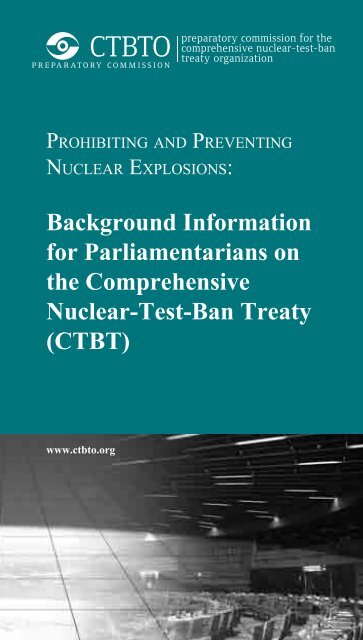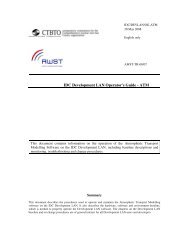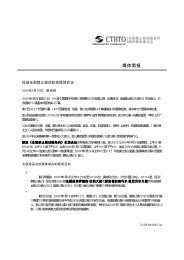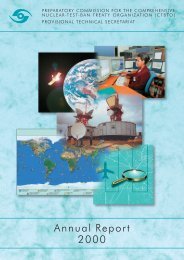CTBT - Comprehensive Nuclear-Test-Ban Treaty Organization
CTBT - Comprehensive Nuclear-Test-Ban Treaty Organization
CTBT - Comprehensive Nuclear-Test-Ban Treaty Organization
You also want an ePaper? Increase the reach of your titles
YUMPU automatically turns print PDFs into web optimized ePapers that Google loves.
Prohibiting and Preventing<strong>Nuclear</strong> Explosions:Background Informationfor Parliamentarians onthe <strong>Comprehensive</strong><strong>Nuclear</strong>-<strong>Test</strong>-<strong>Ban</strong> <strong>Treaty</strong>(<strong>CTBT</strong>)www.ctbto.org
Prohibiting and Preventing<strong>Nuclear</strong> Explosions:Background Informationfor Parliamentarians onthe <strong>Comprehensive</strong><strong>Nuclear</strong>-<strong>Test</strong>-<strong>Ban</strong> <strong>Treaty</strong>(<strong>CTBT</strong>)
iiPrinted in AustriaJuly 2010<strong>CTBT</strong>/LEGREL/LS/2
Contents1. Basic obligations........................................................ 22. Why ratify the <strong>CTBT</strong>?............................................... 33. Scope of the <strong>CTBT</strong>.................................................... 64. History and significance of the <strong>CTBT</strong>....................... 75. Membership benefits................................................. 86. National implementation measures.......................... 107. The National Authority............................................ 128. Checklist for legislators........................................... 149. Ratifying States ....................................................... 1610. Signatory States which have not yet ratified........... 1711. Non-signatory States ............................................... 1812. Entry into force........................................................ 1813. Resolutions by the Inter-Parliamentary Union........ 181
Background Information for Parliamentarians on THE <strong>CTBT</strong>1. Basic obligationsARTICLE I1. Each State Party undertakes not to carry out anynuclear weapon test explosion or any other nuclearexplosion, and to prohibit and prevent any such nuclearexplosion at any place under its jurisdiction orcontrol.2. Each State Party undertakes, furthermore, to refrainfrom causing, encouraging, or in any way participatingin the carrying out of any nuclear weapontest explosion or any other nuclear explosion.2
Background Information for Parliamentarians on THE <strong>CTBT</strong>2. Why ratify the <strong>CTBT</strong>?The aim of the <strong>Comprehensive</strong> <strong>Nuclear</strong>-<strong>Test</strong>-<strong>Ban</strong> <strong>Treaty</strong>(<strong>CTBT</strong>) is to end all nuclear weapon test explosions andany other nuclear explosion in an effectively verifiablemanner. Over 2000 tests were conducted during the period1945 to 1996. Only a few have occurred after 1996 — theyear the <strong>CTBT</strong> was adopted by the United Nations GeneralAssembly and opened for signature. Each and every signatureor ratification strengthens the political value of the<strong>Treaty</strong>. Even without having entered into force, the <strong>CTBT</strong>has helped to create a strong international norm againstnuclear weapon testing.A nuclear test provides the final and irreversible ‘downstream’proof of the intentions of a State regarding itspursuit of nuclear energy for peaceful or for weapons purposes.The <strong>CTBT</strong> constitutes, thus, this last and clearlyvisible barrier between the peaceful legitimate use and themisuse of nuclear energy. This legal line needs to be drawnfirmly and irrevocably.3
Background Information for Parliamentarians on THE <strong>CTBT</strong>The <strong>CTBT</strong> is also a key to easing the rancour between thenuclear haves and have-nots. It is a strong non-proliferationinstrument, a catalyst for nuclear disarmament, and crucialin a world in which we see the resurgence of nuclearenergy.Preparations for entry into force of the <strong>Treaty</strong> are wellunder way by the <strong>CTBT</strong>O Preparatory Commission, withmore than 84% of the International Monitoring System stations(seismic, hydroacoustic, infrasound, radionuclide)installed. States Signatories are equally entitled to all thebenefits of the system. The wealth of data provided by themonitoring system has a variety of potential and importantcivil and scientific applications as well, notably the contributionto tsunami warning centres.The nuclear weapon tests of 2006 and 2009, claimed by theDemocratic People’s Republic of Korea, posed a challengeto the <strong>Treaty</strong> and the Preparatory Commission on severalfronts. These events constituted the most serious trialto the norm against nuclear testing for many years. Internationalcondemnation of these events demonstrated theseriousness of the international community to uphold theglobal nuclear test ban. These events also imposed performancetests for our organization and its nascent verificationregime. Although not all stations have been established orare transmitting data yet, the verification regime neverthelessfunctioned as a system, in a holistic and synergisticway. Regrettable and disquieting as those events were, theverification system’s timely, integrated and coherent performancedemonstrated a high level of reliability. Thesystem has proven to be a valuable investment by the StatesSignatories to ensure that no nuclear test goes undetected.4
Background Information for Parliamentarians on THE <strong>CTBT</strong>The importance of universalization and the urgent entryinto force of the <strong>CTBT</strong> has been widely recognized by theinternational community. This has been evidenced mostrecently through the overwhelming support for the <strong>CTBT</strong>at the United Nations General Assembly, in the SecurityCouncil and at the 2010 Review Conference of the Partiesto the <strong>Treaty</strong> on the Non-Proliferation of <strong>Nuclear</strong> Weapons(NPT).The time has come for the <strong>CTBT</strong> to enter into force. Theopportunity is there and we must respond. We need to worktogether to make the world a safer place. For our own sakeand for the generations to come.Tibor TóthExecutive SecretaryPreparatory Commission for the <strong>Comprehensive</strong><strong>Nuclear</strong>-<strong>Test</strong>-<strong>Ban</strong> <strong>Treaty</strong> <strong>Organization</strong>Vienna, June 20105
Background Information for Parliamentarians on THE <strong>CTBT</strong>3. Scope of the <strong>CTBT</strong>The object and purpose of the <strong>CTBT</strong> is to ban comprehensivelynuclear weapon test explosions and any other nuclearexplosion in any environment in an effectively verifiablemanner. The <strong>CTBT</strong> aims at eliminating nuclear weaponsby constraining the development and qualitative improvementof new or more advanced nuclear weapons. It plays acrucial role in the prevention of nuclear proliferation and innuclear disarmament, thus contributing to a safer and moresecure world.When the <strong>Treaty</strong> enters into force it will establish a treatyimplementingbody (the <strong>Comprehensive</strong> <strong>Nuclear</strong>-<strong>Test</strong>-<strong>Ban</strong><strong>Treaty</strong> <strong>Organization</strong> (<strong>CTBT</strong>O)), including an on-site inspectionmechanism and confidence-building measures as wellas an International Monitoring System (IMS) and InternationalData Centre (IDC). The IMS and IDC are alreadybeing created and are being provisionally operated duringthe preparatory phase by the Preparatory Commissionfor the <strong>CTBT</strong>O and its Provisional Technical Secretariatin Vienna. Seismic, hydroacoustic, infrasound and radionuclidedata are collected through the stations of the IMSand transmitted to Member States via the IDC. The IDCalso processes the raw data received from the stations toderive objective products and services which will supportthe <strong>Treaty</strong> verification responsibilities.If the collected and analysed data indicate an ambiguousevent, States may address concerns about possible noncompliancewith the <strong>Treaty</strong> through a consultation andclarification process after it enters into force and mayrequest an on-site inspection by the <strong>CTBT</strong>O.6
Background Information for Parliamentarians on THE <strong>CTBT</strong>4. History and significance of the <strong>CTBT</strong>The <strong>Comprehensive</strong> <strong>Nuclear</strong>-<strong>Test</strong>-<strong>Ban</strong> <strong>Treaty</strong> (<strong>CTBT</strong>) wasnegotiated and drafted in the Conference on Disarmamentin Geneva and opened for signature in New York in 1996.In the first 50 years following the first nuclear weapon test,there were multiple unsuccessful attempts to negotiate acomprehensive test ban. The conclusion of the <strong>CTBT</strong> essentiallyended 50 years of testing, thus achieving one goal ofthe States Parties to the 1963 Limited <strong>Test</strong>-<strong>Ban</strong> <strong>Treaty</strong> andthe 1968 <strong>Treaty</strong> on the Non-Proliferation of <strong>Nuclear</strong> Weapons(NPT): the discontinuance of all nuclear weapon testexplosions for all time.The conclusion of the <strong>CTBT</strong> was one of the conditions uponwhich States Parties to the NPT agreed to the indefinite extensionof the NPT in 1995. At its 2000 Review Conference,NPT States Parties concluded that signature, ratification andentry into force of the <strong>CTBT</strong> are “the first practical step forthe systematic and progressive efforts to implement article VIof the NPT”, with its aim of nuclear disarmament. In thatsame year, the United Nations Secretary-General included the<strong>CTBT</strong> as one of the 25 core multilateral treaties representativeof the key objectives of the United Nations, promptingmany of the States to take action on the <strong>CTBT</strong> during theMillennium Assembly and thereafter.Prospects for entry into force of the <strong>CTBT</strong> received a muchneeded boost in April 2009 when US President BarackObama announced that his administration will “immediatelyand aggressively” seek the consent of the US Senate for USratification. Other Annex 2 States such as China also indicatedthat they too are eager to achieve entry into force at7
Background Information for Parliamentarians on THE <strong>CTBT</strong>an early date. The Indonesian Foreign Minister’s announcementin April 2010 that his country (another Annex 2 State)will ratify the <strong>CTBT</strong> soon provided significant additionalmomentum. The international support for the <strong>Treaty</strong> is furtherevidenced through the overwhelming support for the2009 <strong>CTBT</strong> resolution at the First Committee of the UnitedNations General Assembly, the Security Council’s call uponStates to bring the <strong>CTBT</strong> into force as expressed in resolution1887, and the unprecedented high level attendance atthe 2009 Conference on Facilitating the Entry into Force ofthe <strong>CTBT</strong>. The Final Document of the 2010 NPT ReviewConference reaffirmed the vital importance of the entry intoforce of the <strong>CTBT</strong> as a core element of the internationalnuclear disarmament and non-proliferation regime.5. Membership benefitsPolitically, States Signatories contribute to regional andinternational peace and security, support the NPT andUnited Nations goals of nuclear non-proliferation and disarmament,and join a community of like-minded States.The 337 <strong>CTBT</strong>O International Monitoring System facilitiescurrently being built in accordance with the <strong>Treaty</strong> (170 seismic,11 hydroacoustic, 60 infrasound and 80 radionuclidestations and 16 radionuclide laboratories) are located all overthe world, including some in the most remote regions suchas the Arctic and Antarctica. It is multilateralism at its best:89 countries from North and South, East and West, are hostingor will host the facilities that no country could build anddeploy alone. These countries and the exact location of thestations are established by Annex 1 to the Protocol to the8
Background Information for Parliamentarians on THE <strong>CTBT</strong><strong>Treaty</strong>. As one of the most extensive global joint ventures,hundreds of station operators and National Data Centre staffsupport the system around the world around the clock. Theyrepresent a nearly invisible, but highly efficient and crucialextended arm of the monitoring system.The raw data as well as processed data products are transmitted,upon request, to States Signatories by the IDC in Vienna.The Preparatory Commission can assist States Signatories inthe establishment of National Data Centres by providing thesatellite link to the IDC and assistance with its installation,software, services of the Help Desk, and specialized trainingfor station operators and managers. States Signatoriescan make use of the range of technologies applied in collecting,transmitting, processing and analysing verificationrelated data. They may also benefit from the utilization ofverification regime data in a variety of civil areas, includingscientific research, disaster preparedness, meteorologicaland climate forecasting, and tsunami warning. The trainingcourses and workshops are free of charge and are very importantto building the capacity of States Signatories to make thebest use of the verification related technologies, including forcivil and scientific applications.As the installation of the IMS progresses, new researchand improved communications technology strengthen andrefine the detection capacities of the system.Currently, 114 States Signatories have established NationalData Centres to receive and process the data and data productscollected by the IMS and transmitted by the IDC inVienna. More than 1145 users worldwide are receiving datathrough their State’s Secure Signatory Account.9
Background Information for Parliamentarians on THE <strong>CTBT</strong>6. National implementation measures6.1. How?Article III of the <strong>CTBT</strong> requires each State Party to take, inaccordance with its constitutional processes, any necessarymeasures to implement its obligations under the <strong>Treaty</strong>.Even in States having a legal system where treaties automaticallyform part of national law, the government mayneed to adopt at least some measures, legislative and/oradministrative, to implement the <strong>Treaty</strong>. It is for each StateParty to decide what measures, in accordance with its constitutionalprocesses, would be necessary or appropriateand how to carry them out.In some cases, the State may determine that existingnational legislation already fulfils the requirements setout in the <strong>Treaty</strong>. In most cases, existing legislation mayneed to be amended or supplemented, or one or more newlaws may need to be passed, and subsidiary regulations oradministrative measures may need to be adopted. Whateverapproaches the State decides to follow, the common goal isto give internal legal effect to all of the State’s obligationsunder the <strong>Treaty</strong> and, in particular, to enable it to legallyenforce those obligations in respect of activities by all personsunder its jurisdiction, including by means of sanctionsfor violations.6.2. What measures?Section 8 below provides a checklist of the main elementsof national legislation to be considered.10
Background Information for Parliamentarians on THE <strong>CTBT</strong>6.3. Where?The legislation shall apply to the whole territory of theState and must be extended to any other place under itsjurisdiction or control in accordance with internationallaw. Furthermore, Article III requires that the legislation beextended extraterritorially to natural persons possessing theState’s nationality, to prohibit such persons from undertakinganywhere any activity prohibited by the <strong>Treaty</strong>.6.4. When?The necessary national implementation measures need to bein force at the time the <strong>CTBT</strong> enters into force. As a generalrule, the measures should therefore be taken either at the timeof ratification or immediately afterwards. In many States, thelegislature has often stipulated that the legislation will enterinto force when the <strong>CTBT</strong> does. In other cases, the State hasdecided to adopt the national normative constraints againstnuclear testing with immediate effect, in advance of the <strong>Treaty</strong>’sentry into force, as an environmental, counterterrorismor other policy based measure.Since 2004, the adoption and enforcement of effective lawsand the establishment of a range of domestic controls aimedat preventing nuclear weapon proliferation among non-Stateactors, in particular for terrorist purposes, have become theobligation of all States under United Nations Security Councilresolution 1540. The creation of the criminal offence ofcarrying out a nuclear explosion, with penalties appropriateto the gravity of the crime, together with measures aimed at11
Background Information for Parliamentarians on THE <strong>CTBT</strong>preventing the acquisition of enabling materials or devices,acts to deter persons from undertaking such activities in theState’s jurisdiction and prevent the State’s territory frombeing a haven for those who might be interested in pursuingsuch activities. Such legislation serves to meet the requirementsof resolution 1540, a binding legal obligation for allStates under the Charter of the United Nations.For these reasons, a number of States have already madeit a criminal offence to carry out a nuclear explosion orto cause, encourage, attempt, assist with or in any wayparticipate in one. Some States, at the time of ratifyingthe <strong>CTBT</strong>, amended their penal code with immediateeffect. Others had already adopted such legislation asnuclear-weapon-free-zone States. Examples of such typesof legislation are available from the <strong>CTBT</strong>O Secretariatupon request.Finally, owing to the extensive activities that are requiredto be taken by the <strong>CTBT</strong>O Preparatory Commission andStates Signatories to establish and provisionally operate theIMS and IDC during the preparatory phase, the State mayfind that it needs to take measures to enable effective cooperationwith the Commission now.7. The National AuthorityArticle III of the <strong>CTBT</strong> requires each State Party to designateor set up a National Authority to “serve as the nationalfocal point for liaison with the <strong>Organization</strong> and with otherStates Parties”.12
Background Information for Parliamentarians on THE <strong>CTBT</strong>The core function of the National Authority is to facilitatethe interaction between States and with the <strong>CTBT</strong>O on allmatters regarding the implementation of the <strong>Treaty</strong> after itsentry into force. Before entry into force of the <strong>Treaty</strong>, mostStates Signatories have already set up at least an interimNational Authority because of the need to cooperate withthe Commission in establishing the verification regime. ForStates hosting monitoring facilities, the National Authorityusually is the governmental entity which negotiates andpromotes the conclusion of the necessary Facility Agreementin order to advance work on the IMS, which mustbe fully operational at entry into force. In other States, theNational Authority is cooperating with the Commissionin establishing a National Data Centre and building thenational capacity to receive and analyse IMS data.In the event of an on-site inspection after entry into forceof the <strong>Treaty</strong>, the role of the National Authority would beparticularly important, considering the negotiations andadministrative arrangements required to facilitate inspectionactivities under the <strong>Treaty</strong>. Such tasks would includecommunication between the inspected State Party and theTechnical Secretariat, consultations on the mandate of theinspection, and privileges and immunities, as well as visas,diplomatic clearance for the inspection aircraft or exemptionissues.The establishment or designation of the National Authorityis mainly an administrative matter. It would usually beestablished as a result of general executive powers of thegovernment. While it is therefore not necessary to includeit in an implementing act or statute, it may be necessary toestablish its mandate and powers by statute, in particular13
Background Information for Parliamentarians on THE <strong>CTBT</strong>when its powers would affect the rights of third parties orit has been assigned some level of enforcement authority.Currently, more than 130 States Signatories have designatedtheir respective National Authorities.8. Checklist for legislatorsThe sections below identify elements that are suggested to betaken into account by States when incorporating the <strong>Treaty</strong>into national law. The <strong>CTBT</strong>O Secretariat has developed andfreely distributes a guide to <strong>CTBT</strong> legislation which containsmodel legislation and commentary. The Secretariat is alsoavailable for consultations or assistance.8.1. Measures explicitly required• Prohibit and prevent nuclear weapon test explosionsand any other nuclear explosion;• Extend the legislation extraterritorially to naturalpersons possessing the State’s nationality regardlessof where the persons commit the act;• Cooperate with, and afford legal assistance to, otherStates Parties;• Designate or set up a National Authority.14
Background Information for Parliamentarians on THE <strong>CTBT</strong>8.2. Other elements normally necessary• Definitions;• Law that is binding also on the government;• Recognition of the legal capacity of the <strong>CTBT</strong>O;• Privileges and immunities of the <strong>CTBT</strong>O, delegatesof its Member States, staff and experts;• Confidentiality of data;• For States hosting a facility in the <strong>CTBT</strong>O InternationalMonitoring System, national arrangementsto enable site selection, construction, operation,maintenance and data transmission;• Procedures to report chemical explosions above thethreshold established by the <strong>Treaty</strong>;• Inspection powers and procedures;• Authority to issue regulations;• Allocation of budgetary and personnel resources toparticipate in the <strong>CTBT</strong>O and its activities.8.3. Measures which may be necessary during thepreparatory phaseTo establish and provisionally operate the IMS and IDCduring the preparatory phase, some States Signatories haveadopted measures to:• Establish or designate the National Authority andNational Data Centre;• Recognize the legal capacity of the PreparatoryCommission;15
Background Information for Parliamentarians on THE <strong>CTBT</strong>• Confer privileges and immunities upon the PreparatoryCommission, delegates, the Executive Secretary,staff and experts;• Authorize the negotiation and conclusion ofFacility Agreements or Arrangements with the PreparatoryCommission;• Authorize and enable the conduct of activities pursuantto the Resolution establishing the PreparatoryCommission, including cooperation between theNational Authority and the Preparatory Commission;• Allocate budgetary and personnel resources to participatein the Commission and its activities.9. Ratifying States (153 as of May 2010)Afghanistan, Albania, Algeria*, Andorra, Antigua andBarbuda, Argentina*, Armenia, Australia*, Austria*,Azerbaijan, Bahamas, Bahrain, <strong>Ban</strong>gladesh*, Barbados,Belarus, Belgium*, Belize, Benin, Bolivia (PlurinationalState of), Bosnia and Herzegovina, Botswana, Brazil*,Bulgaria*, Burkina Faso, Burundi, Cambodia, Cameroon,Canada*, Cape Verde, Central African Republic, Chile*,Colombia*, Cook Islands, Costa Rica, Côte d’Ivoire, Croatia,Cyprus, Czech Republic, Democratic Republic of theCongo*, Denmark, Djibouti, Dominican Republic, Ecuador,El Salvador, Eritrea, Estonia, Ethiopia, Fiji, Finland*,France*, Gabon, Georgia, Germany*, Greece, Grenada,Guyana, Haiti, Holy See, Honduras, Hungary*, Iceland,Ireland, Italy*, Jamaica, Japan*, Jordan, Kazakhstan, Kenya,Kiribati, Kuwait, Kyrgyzstan, Lao People’s DemocraticRepublic, Latvia, Lebanon, Lesotho, Liberia, LibyanArab Jamahiriya, Liechtenstein, Lithuania, Luxembourg,16
Background Information for Parliamentarians on THE <strong>CTBT</strong>Madagascar, Malawi, Malaysia, Maldives, Mali, Malta,Marshall Islands, Mauritania, Mexico*, Micronesia(Federated States of), Monaco, Mongolia, Montenegro,Morocco, Mozambique, Namibia, Nauru, Netherlands*,New Zealand, Nicaragua, Niger, Nigeria, Norway*, Oman,Palau, Panama, Paraguay, Peru*, Philippines, Poland*,Portugal, Qatar, Republic of Korea*, Republic of Moldova,Romania*, Russian Federation*, Rwanda, Saint Kitts andNevis, Saint Lucia, Saint Vincent and the Grenadines, Samoa,San Marino, Senegal, Serbia, Seychelles, Sierra Leone,Singapore, Slovakia*, Slovenia, South Africa*, Spain*,Sudan, Suriname, Sweden*, Switzerland*, Tajikistan, Theformer Yugoslav Republic of Macedonia, Togo, Trinidadand Tobago, Tunisia, Turkey*, Turkmenistan, Uganda,Ukraine*, United Arab Emirates, United Kingdom of GreatBritain and Northern Ireland*, United Republic of Tanzania,Uruguay, Uzbekistan, Vanuatu, Venezuela (BolivarianRepublic of), Viet Nam* and Zambia.10. Signatory States which have notyet ratified (29 as of May 2010)Angola, Brunei Darussalam, Chad, China*, Comoros,Congo, Egypt*, Equatorial Guinea, Gambia, Ghana,Guatemala, Guinea, Guinea-Bissau, Indonesia*, Iran(Islamic Republic of)*, Iraq, Israel*, Myanmar, Nepal,Papua New Guinea, Sao Tome and Principe, SolomonIslands, Sri Lanka, Swaziland, Thailand, Timor-Leste,United States of America*, Yemen and Zimbabwe.* States, listed in Annex 2, which must ratify the <strong>CTBT</strong> before it canenter into force.17
Background Information for Parliamentarians on THE <strong>CTBT</strong>11. Non-signatory States(13 as of May 2010)Bhutan, Cuba, Democratic People’s Republic of Korea*,Dominica, India*, Mauritius, Niue, Pakistan*, Saudi Arabia,Somalia, Syrian Arab Republic, Tonga and Tuvalu.12. Entry into forceThe <strong>CTBT</strong> will enter into force 180 days after it has beenratified by the 44 States listed in Annex 2. These 44 Statesformally participated in the negotiations of the <strong>Treaty</strong> andpossessed nuclear power reactors or research reactors at thetime. Nine of those States have not yet ratified the <strong>Treaty</strong>.13. Resolutions by the Inter-ParliamentaryUnion13.1. Resolutions 1995–2009The Inter-Parliamentary Union has adopted a series of resolutionsin which either explicit reference is made to the <strong>CTBT</strong>or the stated aims are consistent with those of the <strong>CTBT</strong>:• The Importance of Adhering to the ObligationsSpecified in the <strong>Treaty</strong> on the Non-Proliferation of<strong>Nuclear</strong> Weapons (91st Inter-Parliamentary Conference/Paris,1994)* States, listed in Annex 2, which must ratify the <strong>CTBT</strong> before it canenter into force.18
Background Information for Parliamentarians on THE <strong>CTBT</strong>• To <strong>Comprehensive</strong>ly <strong>Ban</strong> <strong>Nuclear</strong> Weapons <strong>Test</strong>ingand Halt All Present <strong>Nuclear</strong> Weapons <strong>Test</strong>s (94thInter-Parliamentary Conference/Bucharest, 1995)• Parliamentary Action to Encourage all Countriesto Sign and Ratify the <strong>Comprehensive</strong> <strong>Test</strong> <strong>Ban</strong><strong>Treaty</strong> Prohibiting All <strong>Nuclear</strong> <strong>Test</strong>ing, to EncourageUniversal and Non-discriminatory <strong>Nuclear</strong> Non-Proliferation Measures and to Work Towards theEventual Elimination of All <strong>Nuclear</strong> Weapons (101stInter-Parliamentary Conference/Brussels, 1999)• Importance of the Non-Proliferation of <strong>Nuclear</strong>,Chemical and Biological Weapons of Mass Destructionand of Missiles, Including the Prevention oftheir Use by Terrorists (108th Inter-ParliamentaryConference/Santiago (Chile), 2003)• The Role of Parliaments in Assisting MultilateralOrganisations in Ensuring Peace and Security andin Building an International Coalition for Peace(109th IPU Assembly/Geneva, 2003)• The Announcement by the Democratic People’sRepublic of Korea of its <strong>Nuclear</strong> Weapons <strong>Test</strong> andthe Strengthening of the <strong>Nuclear</strong> Non-ProliferationRegime (115th IPU Assembly/Geneva, 2006)• Advancing <strong>Nuclear</strong> Non-Proliferation and Disarmament,and Securing the Entry into Force of the<strong>Comprehensive</strong> <strong>Nuclear</strong>-<strong>Test</strong>-<strong>Ban</strong> <strong>Treaty</strong>: the Roleof Parliaments (120th IPU Assembly/Addis Ababa,2009).19
Background Information for Parliamentarians on THE <strong>CTBT</strong>13.2. Text of the 2009 ResolutionAdvancing <strong>Nuclear</strong> Non-Proliferation and Disarmament,and Securing the Entry into Force of the<strong>Comprehensive</strong> <strong>Nuclear</strong>-<strong>Test</strong>-<strong>Ban</strong> <strong>Treaty</strong>: the Roleof ParliamentsResolution adopted by consensus* by the 120th IPUAssembly (Addis Ababa, 10 April 2009)The 120th Assembly of the Inter-Parliamentary Union,Determined to advance nuclear disarmament and nonproliferationwith a view to strengthening internationalpeace and security in accordance with the principlesof the Charter of the United Nations, and underscoringthat substantial progress in the field of nucleardisarmament requires active support and dedicated contributionsby all States,Deeply concerned that the existence in the world ofsome 26,000 nuclear weapons, whose use can havedevastating human, environmental and economic consequences,constitutes a threat to international peaceand security,Reaffirming the obligations of nuclear-weapon Statesunder Article VI of the <strong>Treaty</strong> on the Non-Proliferationof <strong>Nuclear</strong> Weapons (NPT) towards nuclear disarmamentand their unequivocal undertakings under the1995 and 2000 NPT Review Conferences in this regard,20
Background Information for Parliamentarians on THE <strong>CTBT</strong>Recalling past IPU resolutions designed to advance theprogress of non-proliferation and disarmament and toencourage ratification of the <strong>Comprehensive</strong> <strong>Nuclear</strong>-<strong>Test</strong>-<strong>Ban</strong> <strong>Treaty</strong> (<strong>CTBT</strong>), in particular the one adoptedby the 101st Inter-Parliamentary Conference (Brussels,April 1999),Reaffirming the crucial importance of the NPT as thecornerstone of the nuclear non-proliferation and disarmamentregime, which sets out legal obligations inthese fields at the same time as it guarantees the right todevelop nuclear energy for peaceful purposes,Recalling international conventions and resolutionsadopted by the UN Security Council and the IPU onthe right to access nuclear technology for peacefulpurposes,Concerned that non-compliance with all provisions ofthe NPT by some States has undermined the three pillarsof the NPT and eroded the benefits derived by allStates,Considering the importance of all States ensuring strictcompliance with their nuclear non-proliferation anddisarmament obligations,Recognizing the progress made under the NPT and theresulting safeguards agreements, and urging the nuclearweaponStates to fully implement the commitments theyundertook during the NPT Review Conferences in 1995and 2000,21
Background Information for Parliamentarians on THE <strong>CTBT</strong>Considering the important role played by bilateraldisarmament treaties, such as the Strategic ArmsReduction <strong>Treaty</strong>, welcoming the cuts made by somenuclear-weapon States to their nuclear arsenals andurging deeper, faster and irreversible cuts to all typesof nuclear weapons by all nuclear-armed States,Convinced that the best way to guarantee world peaceand stability is to take effective measures for internationalsecurity, including disarmament and thenon-proliferation of nuclear weapons,Recognizing the benefits of confidence-building measures,such as the de-emphasizing of nuclear weaponsin national security doctrines and the removal ofnuclear weapons systems from high alert status, andmindful of the mutual confidence engendered by freelyagreed regional nuclear-weapon-free zones, such asthose in the South Pacific, Africa, South-East Asia andLatin America,Underscoring the importance of establishing anuclear-weapon-free zone in the Middle East, withoutexception,Deeply concerned by the risk of accidental or unauthorizeduse of nuclear weapons and by the resulting toll inhuman life, environmental damage, political tensions,economic loss and market instability,Pledging to bring about fuller parliamentary involvementin the disarmament process, particularly in respect23
Background Information for Parliamentarians on THE <strong>CTBT</strong>of nuclear weapons, in the form of greater pressure ongovernments and detailed scrutiny of military budgetsand procurement programmes allocated for nuclearweapons development,Mindful of the fact that national defence policiesshould not compromise the fundamental principle ofundiminished security for all, and thus recalling thatany unilateral deployment or build-up of strategic antiballisticmissile assets affecting the deterrent capacity ofnuclear-weapon States might hinder the process ofnuclear disarmament,1. Calls on all nuclear-armed States to make deeper,faster and irreversible cuts to all types of nuclearweapons;2. Urges all States to redouble their efforts to preventand combat the proliferation of nuclear and otherweapons of mass destruction in accordance withinternational law;3. Underscores the vital role of the <strong>CTBT</strong> as part of aframework for achieving nuclear non-proliferationand disarmament, and expresses disappointmentthat, thirteen years after it was opened for signature,the <strong>Treaty</strong> has yet to enter into force;4. Stresses the vital importance and urgency of signatureand ratification, without delay and withoutconditions, to achieve the earliest entry into forceof the <strong>CTBT</strong>;5. Welcomes the signatures/ratifications of the <strong>CTBT</strong>in 2008 by Barbados, Burundi, Colombia, Lebanon,Malawi, Malaysia, Mozambique and Timor-Leste;24
Background Information for Parliamentarians on THE <strong>CTBT</strong>6. Calls upon the parliaments of all States that havenot yet signed and ratified the <strong>CTBT</strong> to exert pressureon their governments to do so;7. Especially urges parliaments of all remainingStates listed in Annex 2 of the <strong>CTBT</strong>, whose ratificationis required to bring the treaty into force, tourge their governments to immediately sign and ratifythe treaty;8. Calls on all nuclear-armed States to continue toobserve their moratoria on nuclear-weapon testing,on all States that have not already done so toproceed, on a voluntary basis, to dismantle theirnuclear test sites, and on all States to maintain supportfor the <strong>CTBT</strong> <strong>Organization</strong> verification systemuntil the <strong>CTBT</strong> enters into force;9. Urges immediate commencement of negotiationson a non-discriminatory, multilateral and internationallyverifiable treaty banning the productionof fissile material for nuclear weapons and othernuclear explosive devices;10. Invites States to initiate negotiations with a viewto concluding a treaty on the prohibition of shortrangeand intermediate-range land missiles thatcarry nuclear warheads;11. Recommends that States with ballistic missilecapacity that have not acceded to the Hague Codeof Conduct do so quickly in order to render thisinstrument completely effective against ballisticmissile proliferation;12. Calls on all nuclear-armed States to adopt confidencebuildingmeasures, including the de-emphasizingof nuclear weapons in national security doctrines and25
Background Information for Parliamentarians on THE <strong>CTBT</strong>the removal of all nuclear weapons from high alertstatus;13. Reaffirms the importance of achieving universalaccession to the NPT, and of States not party tothe NPT acceding to it promptly and unconditionallyas non-nuclear-weapon States, and of all Statesparty to the NPT fulfilling their obligations underthe <strong>Treaty</strong>;14. Is hopeful that the States concerned will be requiredto sign and comply with safeguards agreements andadditional protocols, in particular those concludedin the framework of the IAEA, as a prerequisite forbenefiting from international cooperation in thefield of nuclear energy for civilian purposes;15. Calls on all States to support the initiatives aimedat globalizing the obligations set forth in the <strong>Treaty</strong>signed between the United States and the formerSoviet Union on the elimination of their intermediate-rangeand shorter-range missiles (INF <strong>Treaty</strong>)and to promote cooperative approaches to the issueof missile defence, beginning with a joint assessmentof possible threats;16. Calls on national parliaments to ensure State compliancewith all their disarmament and non-proliferationobligations;17. Urges parliaments to provide strong and effectivesupport to all resolutions and recommendationson peace, disarmament and security previouslyadopted at IPU Conferences and Assemblies;18. Encourages parliaments to monitor closely nationalimplementation of all arms control, non-proliferationand disarmament treaties and UN resolutions,26
Background Information for Parliamentarians on THE <strong>CTBT</strong>to engage their publics on nuclear issues and toreport back to the IPU on progress made;19. Urges IAEA Member States or parties to a safeguardsagreement to lend strong and constant supportto the IAEA so that it can honour its safeguardsobligations and therefore to cooperate in good faithwith the IAEA by providing it with all informationrequested;20. Calls on States whose ratification is needed for theentry into force of general safeguards agreementsto take the necessary steps to that end as soon aspossible;21. Further calls on the States party to a safeguardsagreement which have not yet signed and/or ratifiedan additional protocol to do so as soon aspossible;22. Recommends that the United Nations, especiallythe Office of Disarmament Affairs, and the PreparatoryCommission for the <strong>CTBT</strong> <strong>Organization</strong>,strengthen cooperation with the IPU;23. Invites the IPU Secretary General to contact, on anannual basis, the parliaments of the States whichhave not signed and/or ratified the internationaltreaties mentioned in the present resolution with aview to encouraging them to do so;24. Urges parliaments to instruct governments to expresstheir support for the UN Secretary-General’sFive Point Proposal contained in his address, “TheUnited Nations and Security in a <strong>Nuclear</strong>-Weapon-Free World”;25. Encourages parliaments to support the full ratificationand implementation of existing nuclear-weapon-free27
Background Information for Parliamentarians on THE <strong>CTBT</strong>zones, and to explore the possibility of establishingadditional nuclear-weapon-free zones freely agreedby States in specific regions;26. Calls for the necessary steps to be taken to declarethe Middle East a nuclear-weapon-free zone, withoutexception, in keeping with the resolution endorsed bythe NPT Review Conference in 1995;27. Encourages all parliaments to remain seized of theissue at the highest political level and, where possible,to promote compliance with the NPT throughbilateral and joint outreach, seminars and othermeans.* The following delegations expressed reservations on parts of theresolution:- China — operative paragraphs 10, 11 and 15;- India — preambular paragraphs 4, 5, 7, 10 and 12 and operativeparagraphs 3, 4, 6, 7, 8 and 13;- Iran (Islamic Republic of) — preambular paragraph 18 and operativeparagraphs 6, 10, 21 and 26;- Pakistan — preambular paragraphs 7 and 13 and operative paragraphs13, 14, 16, 17, 18 and 23.28
















